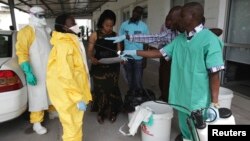When the ebola crisis erupted in 2014, the Centers for Disease Control and Prevention sent staff to help West African countries contain the pandemic. The National Institutes of Health (NIH) funded research and supported pharmaceutical giants to produce a vaccine that would save lives but not turn a profit.
In his budget proposal, President Donald Trump seeks big cuts in spending on global health research. Those cuts could affect work being done to end malaria and AIDS and protect against other infectious diseases.
Trump’s proposed 2018 budget calls for an 18 percent funding cut for NIH and a 17 percent cut for the CDC.
Impact on health security
“If these cuts as proposed were enacted, it would have severe impact on health security,” said Stephen Morrison, who heads the Global Health Policy Center at the Center for Strategic and International Studies.
Watch: Proposed US Budget Cuts Could Have Severe Impact on Health Security
And in the long run could be costlier because it’s far cheaper to be ready for a disease outbreak than to fight one once it starts, Jami Bay Nishi of the Global Health Technologies Coalition said.
“The National Academy of Medicine put out a report estimating that responding to a pandemic threat costs $60 billion,” she said. “Yet, ongoing investment in preventative research in attempts to mitigate against a future threat is $1 billion per year.”
U.S. investments, Nishi said, have produced malaria drugs that have saved 750,000 lives and an inexpensive meningitis vaccine that has prevented nearly 400,000 deaths.
The NIH has been instrumental in the fight against AIDS and malaria. AIDS deaths are now close to half of what they were in 2005, according to the U.N. AIDS agency, and researchers seem to be closing in on a malaria vaccine.
In addition, large pharmaceutical companies, like Johnson and Johnson, need the government to back research, especially for drugs for low-income countries. said Jamie Taylor of Johnson and Johnson.
“We can’t do it on our own, and that’s definitive,” she said.
If cuts become routine
But, Morrison observed, the president’s budget request isn’t a done deal.
“He’s not going to get all that he wants, but he’s going to get something,” he said.
The main problem, as Morrison and others see it, is if budget cuts continue, the U.S. will lose its position as a world leader in medical research, and the world will be more vulnerable to the spread of infectious disease.
Elizabeth Cameron, from the Nuclear Threat Initiative, says bioterrorism could also become a greater risk to the U.S.
“(It’s) absolutely vital that we get to a point where we’re able to respond to any disease threat that comes our way no matter how it comes our way,” Cameron said.
And, finally, Nishi argues, U.S. research and development (R&D) creates jobs that would be lost by budget cuts.
“U.S. government investments in global health R&D not only save millions of lives around the world, but they support U.S. jobs, the U.S. economy and U.S. health security,” she said.
But the secretary of the Health and Human Services Department thinks budget cuts can be made without any loss of research.
“I think what the budget is trying to do, in the first step in this process, is trying to bring focus to the kinds of things that we ought to be able to do to get a bigger bang for our buck,” said Dr. Tom Price, secretary of HHS.
Congress will tackle these issues when the lawmakers return from their summer recess in September.







